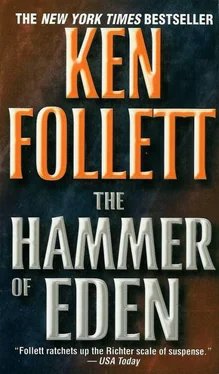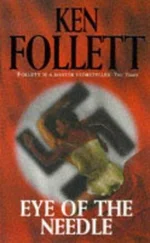“Thanks.” As she hung up, she hoped she merited his confidence.
Three days left .
* * *
By midafternoon the emergency operations center was up and running.
The officers’ club looked like a Spanish villa. Inside, it was a gloomy imitation of a country club, with cheap paneling, bad murals, and ugly light fixtures. The smell of the skunk had not gone away.
The cavernous ballroom had been fitted out as a command post. In one corner was the head shed, a top table with seats for the heads of the principal agencies involved in managing the crisis, including the San Francisco police, firefighters and medical people, the mayor’s office of emergency services, and a representative of the governor. The experts from headquarters, who were even now flying from Washington to San Francisco in an FBI jet, would sit here.
Around the room, groups of tables were set up for the different teams that would work on the case: intelligence and investigation, the core of the effort; negotiation and SWAT teams that would be called in if hostages were taken; an administration and technical support team that would grow if the crisis escalated; a legal team to expedite search warrants, arrest warrants, or wiretaps; and an evidence response team, which would enter any crime scene after the event and collect evidence.
Laptop computers on each table were linked in a local network. The FBI had long used a paper-based information control system called Rapid Start, but now it had developed a computerized version, using Microsoft Access software. But paper had not disappeared. Around two sides of the room, notice boards covered the walls: lead status boards, event boards, subject boards, demand boards, and hostage boards. Key data and clues would be written up here so that everyone could see them at a glance. Right now the subject board had one name — Richard Granger — and two pictures. The lead status board had a picture of a seismic vibrator.
The room was big enough for a couple of hundred people, but so far there were only about forty. They were mostly grouped around the intelligence and investigation table, speaking into phones, tapping keyboards, and reading files on screen. Judy had divided them into teams, each with a leader who monitored the others, so that she could keep track of progress by talking to three people.
There was an air of subdued urgency. Everyone was calm, but they were concentrating hard and working intensely. No one stopped for coffee or schmoozed over the photocopier or went outside for a cigarette. Later, if the situation developed into a full-blown crisis, the atmosphere would change, Judy knew: people would be yelling into phones, the expletive quotient would multiply, tempers would fray, and it would be her job to keep the lid on the cauldron.
Remembering Bo’s tip, she pulled up a chair next to Carl Theobald, a bright young agent in a fashionable dark blue shirt. He was the leader of the team reviewing Marvin Hayes’s files. “Anything?” she said.
He shook his head. “We don’t really know what we’re looking for, but whatever it is, we haven’t found it yet.”
She nodded. She had given this team a vague task, but she could not help that. They had to look for something out of the ordinary. A lot depended on the intuition of the individual agent. Some people could smell deceit even in a computer.
“Are we sure we have everything on file?” she asked.
Carl shrugged. “We should.”
“Check whether they kept any paper records.”
“They’re not supposed to.…”
“But people do.”
“Okay.”
Rosa called her back to the head shed for a phone call. It was Michael. She smiled as she picked up. “Hi.”
“Hi. I’ve got a problem tonight. I can’t make it.”
She was shocked by his tone. He sounded curt and unfriendly. For the last few days he had been warm and affectionate. But this was the original Michael, the one who had turned her away from his door and told her to make an appointment. “What is it?” she said.
“Something came up. I’m sorry to cancel on you.”
“Michael, what the hell is wrong?”
“I’m in kind of a rush. I’ll call you.”
“Okay,” she said.
He hung up.
She cradled the phone, feeling hurt. “Now, what was all that about?” she said to herself. Just as I was getting fond of the guy. What is it with him? Why can’t he stay the way he was on Sunday night? Or even when he called me this morning?
Carl Theobald interrupted her thoughts. He looked troubled. “Marvin Hayes is giving me a hard time,” he said. “They do have some paper records, but when I said I needed to see them, he pretty much told me to shove it.”
“Don’t worry, Carl,” Judy said. “These things are sent by heaven to teach us patience and tolerance. I’ll just go and tear his balls off.”
The agents nearby heard her and laughed.
“Is that what patience and tolerance means?” Carl said with a grin. “I must remember that.”
“Come with me, I’ll show you,” she said.
They went outside and jumped in her car. It took fifteen minutes to reach the Federal Building on Golden Gate Avenue. As they went up in the elevator, Judy wondered how to deal with Marvin. Should she tear his balls off or be conciliatory? The cooperative approach worked only if the other party was willing. With Marvin she had probably gone past that point forever.
She hesitated outside the door to the Organized Crime squad room. Okay, I’ll be Xena, the warrior princess .
She went in, and Carl followed.
Marvin was on the phone, grinning broadly, telling a joke. “So the barman says to the guy, there’s a badger in the back room that gives the best blow job—”
Judy leaned on his desk and said loudly: “What’s this crap you’re giving Carl?”
“Someone’s interrupting me, Joe,” he said. “I’ll call you right back.” He hung up. “What can I do for you, Judy?”
She leaned closer, putting herself in his face. “Stop dicking around.”
“What is it with you?” he said, sounding aggrieved. “What do you mean by going over my records as if I must have made some goddamn mistake?”
He had not necessarily made a mistake. When the perpetrator presented himself to the investigating team in the guise of a bystander or witness, he generally tried to make sure that they did not suspect him. It was not the fault of the investigators, but it was bound to make them feel foolish.
“I think you may have talked to the perpetrator,” she said. “Where are these paper records?”
He smoothed his yellow tie. “All we have are some notes from the press conference that never got keyed into the computer.”
“Show me.”
He pointed to a box file on a side table against the wall. “Help yourself.”
She opened the file. On top was an invoice for the rental of a small public address system with microphones.
“You won’t find a damn thing,” Marvin said.
He might be right, but she had to try, and it was dumb of him to obstruct her. A smarter man would have said, “Hey, if I overlooked something, I sure hope you find it.” Everyone made mistakes. But Marvin was now too defensive to be gracious. He just had to prove Judy wrong.
It would be embarrassing if she was wrong.
She rifled through the papers. There were some faxes from newspapers asking for details of the press conference, a note about how many chairs would be needed, and a guest list, a form on which the journalists attending the press conference had been asked to put their names and the publications or broadcasters they represented. Judy ran her eye down the list.
“What the hell is this?” she said suddenly. “Florence Shoebury, Eisenhower Junior High?”
Читать дальше












